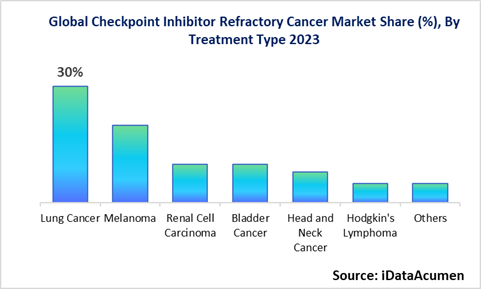Checkpoint Inhibitor Refractory Cancer Market is expected to reach US$ 19.1 Bn in 2030 with a growth rate of 27.8%.
The checkpoint inhibitor refractory cancer market involves pharmaceutical therapies for cancer patients who have stopped responding to initial checkpoint inhibitor treatment. Checkpoint inhibitors are a type of immunotherapy that helps the immune system recognize and attack cancer cells. However, many patients develop resistance over time, creating the need for newer therapies.
The rising prevalence of cancer globally and increasing cases of acquired resistance to checkpoint inhibitors like Keytruda and Opdivo are major factors driving growth in the checkpoint inhibitor refractory cancer market. According to WHO estimates, new cancer cases are likely to rise by 60% over the next 20 years. At the same time, most patients treated with checkpoint inhibitors eventually develop resistance. This is creating significant demand for newer therapies that can overcome resistance mechanisms.

The market is witnessing robust R&D activity and the launch of targeted therapies with novel mechanisms of action compared to existing options. Companies are focused on leveraging next-generation sequencing, AI, and real-world data to better elucidate the complex cancer biology behind resistance and develop effective therapies. Strategic partnerships and M&A are on the rise as players look to fast-track novel assets. Going forward, newer platforms like mRNA vaccines, microbiome therapies, CAR-T cell therapies, and oncolytic viruses hold promise in boosting immune response against refractory cancers.
The rising prevalence of cancer globally and increasing cases of acquired resistance to checkpoint inhibitors like Keytruda and Opdivo are the major factors driving growth in the checkpoint inhibitor refractory cancer market.
According to WHO estimates, new cancer cases are likely to rise by 60% over the next 20 years, from 14 million new cases in 2012 to 22 million cases in 2030. The growing cancer burden is leading to increasing utilization of treatments like chemotherapy, targeted therapy, and immunotherapy. However, most patients develop resistance to these initial treatments over time, creating demand for newer therapies in the refractory setting.
At the same time, though checkpoint inhibitors like Keytruda, Opdivo and Yervoy have revolutionized cancer treatment, most patients eventually become refractory to these immunotherapies as well. For instance, in non-small cell lung cancer (NSCLC), the response rate with anti-PD-1 monotherapy is only around 20%. This highlights the urgent need for newer therapies that can overcome resistance to existing checkpoint inhibitors.
The market is witnessing robust R&D activity leading to the launch of targeted therapies with novel mechanisms compared to existing options. Companies are using next-generation sequencing, AI, and real-world data to better elucidate the complex cancer biology behind resistance mechanisms. Strategic partnerships and M&A deals are on the rise as players look to fast-track novel assets in their pipelines.
Going forward, newer platforms like mRNA vaccines, microbiome therapies, CAR-T cell therapies, and oncolytic viruses hold promise in activating anti-tumor immunity and overcoming resistance in refractory cancers. Overall, the rising patient pool globally coupled with increasing resistance to existing immunotherapies is creating significant opportunities.
Drivers:
- The rising prevalence of cancer globally is fueling market growth. According to WHO estimates, global cancer burden is expected to rise by 60% from 14 million cases in 2012 to 22 million cases by 2030.
- Increasing cases of resistance and reduced response to existing PD-1/PD-L1 and CTLA-4 inhibitor immunotherapies like Keytruda and Opdivo are driving the need for newer therapies.
Trends:
- Leveraging real-world data and AI platforms to better understand resistance mechanisms and predictors of response.
- Strategic partnerships and M&A activity is on rise as companies look to fast-track novel therapies.
Opportunity:
- Emerging platforms like mRNA vaccines, microbiome therapies, CAR-T cell therapies, and oncolytic viruses hold promise in overcoming resistance mechanisms.
Key Report Insights:
- North America accounted for the largest share of over 42% in 2023. Prominent players like Merck, Bristol-Myers Squibb, Roche, Amgen with strong commercial presence in the region is driving growth. Rising cancer prevalence is also spurring R&D activity.
- Europe accounted for the second largest share of over 32% in 2023. Companies like AstraZeneca, Roche, Merck KGaA have significant presence. Increasing investments into oncology research and growing approvals for therapies like Bavencio, Imfinzi are key regional growth drivers.
- Prominent companies with strong presence globally include Merck, Bristol-Myers Squibb, AstraZeneca, Roche, and Pfizer. Strategic partnerships and M&A activity by these players to expand their oncology pipeline is rising.
Checkpoint Inhibitor Refractory Cancer Market Segmentation:
By Mechanism of Action
- PD-1 Inhibitors
- PD-L1 Inhibitors
- CTLA-4 Inhibitors
- IDO1 Inhibitors
- A2AR Inhibitors
- LAG3 Inhibitors
- Others
By Cancer Type
- Lung Cancer
- Melanoma
- Renal Cell Carcinoma
- Bladder Cancer
- Head and Neck Cancer
- Hodgkin's Lymphoma
- Others
By Route of Administration
- Intravenous
- Oral
- Others
By Distribution Channel
- Hospital Pharmacy
- Retail Pharmacy
- Online Pharmacy
By Region
- North America
- U.S.
- Canada
- Europe
- Germany
- U.K.
- Spain
- France
- Italy
- Russia
- Rest of Europe
- Asia Pacific
- China
- India
- Japan
- Australia
- South Korea
- ASEAN
- Rest of Asia Pacific
- Latin America
- Brazil
- Argentina
- Mexico
- Rest of Latin America
- Middle East & Africa
- GCC Countries
- Israel,
- South Africa
- North Africa
- Central Africa
- Rest of the Middle East
Definition:
“The checkpoint inhibitor refractory cancer market involves novel treatments for cancer patients whose disease has progressed after initial treatment with checkpoint inhibitor immunotherapies like PD-1 and PD-L1 inhibitors. Checkpoint inhibitors work by activating the immune system against cancer, but their efficacy reduces over time as patients develop resistance. The refractory cancer market consists of newer therapies that target alternate immune pathways, use combination approaches, or leverage novel modalities to overcome resistance mechanisms in difficult-to-treat cancers. It aims to address the high unmet need for effective therapies in checkpoint inhibitor relapsed or refractory cancer patients.”